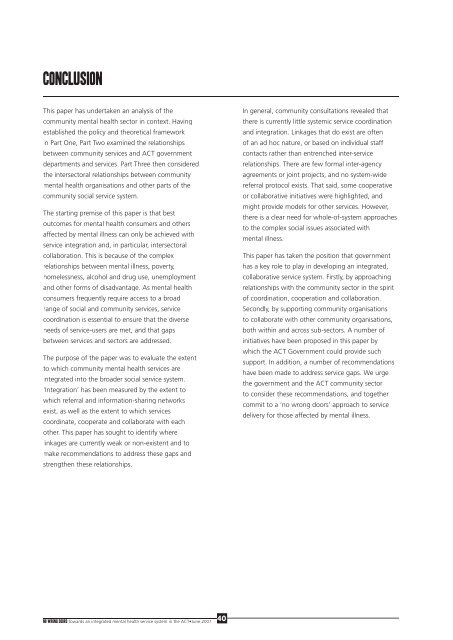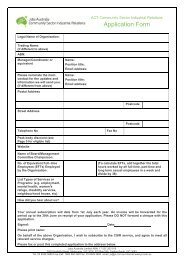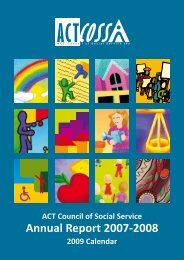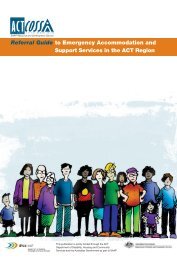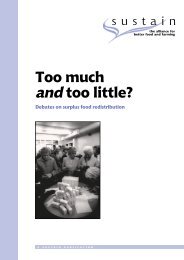actcoss text final.indd - ACT Council of Social Service
actcoss text final.indd - ACT Council of Social Service
actcoss text final.indd - ACT Council of Social Service
You also want an ePaper? Increase the reach of your titles
YUMPU automatically turns print PDFs into web optimized ePapers that Google loves.
conclusion<br />
This paper has undertaken an analysis <strong>of</strong> the<br />
community mental health sector in con<strong>text</strong>. Having<br />
established the policy and theoretical framework<br />
in Part One, Part Two examined the relationships<br />
between community services and <strong>ACT</strong> government<br />
departments and services. Part Three then considered<br />
the intersectoral relationships between community<br />
mental health organisations and other parts <strong>of</strong> the<br />
community social service system.<br />
The starting premise <strong>of</strong> this paper is that best<br />
outcomes for mental health consumers and others<br />
affected by mental illness can only be achieved with<br />
service integration and, in particular, intersectoral<br />
collaboration. This is because <strong>of</strong> the complex<br />
relationships between mental illness, poverty,<br />
homelessness, alcohol and drug use, unemployment<br />
and other forms <strong>of</strong> disadvantage. As mental health<br />
consumers frequently require access to a broad<br />
range <strong>of</strong> social and community services, service<br />
coordination is essential to ensure that the diverse<br />
needs <strong>of</strong> service-users are met, and that gaps<br />
between services and sectors are addressed.<br />
The purpose <strong>of</strong> the paper was to evaluate the extent<br />
to which community mental health services are<br />
integrated into the broader social service system.<br />
‘Integration’ has been measured by the extent to<br />
which referral and information-sharing networks<br />
exist, as well as the extent to which services<br />
coordinate, cooperate and collaborate with each<br />
other. This paper has sought to identify where<br />
linkages are currently weak or non-existent and to<br />
make recommendations to address these gaps and<br />
strengthen these relationships.<br />
In general, community consultations revealed that<br />
there is currently little systemic service coordination<br />
and integration. Linkages that do exist are <strong>of</strong>ten<br />
<strong>of</strong> an ad hoc nature, or based on individual staff<br />
contacts rather than entrenched inter-service<br />
relationships. There are few formal inter-agency<br />
agreements or joint projects, and no system-wide<br />
referral protocol exists. That said, some cooperative<br />
or collaborative initiatives were highlighted, and<br />
might provide models for other services. However,<br />
there is a clear need for whole-<strong>of</strong>-system approaches<br />
to the complex social issues associated with<br />
mental illness.<br />
This paper has taken the position that government<br />
has a key role to play in developing an integrated,<br />
collaborative service system. Firstly, by approaching<br />
relationships with the community sector in the spirit<br />
<strong>of</strong> coordination, cooperation and collaboration.<br />
Secondly, by supporting community organisations<br />
to collaborate with other community organisations,<br />
both within and across sub-sectors. A number <strong>of</strong><br />
initiatives have been proposed in this paper by<br />
which the <strong>ACT</strong> Government could provide such<br />
support. In addition, a number <strong>of</strong> recommendations<br />
have been made to address service gaps. We urge<br />
the government and the <strong>ACT</strong> community sector<br />
to consider these recommendations, and together<br />
commit to a ‘no wrong doors’ approach to service<br />
delivery for those affected by mental illness.<br />
NO WRONG DOORS Towards an integrated mental health service system in the <strong>ACT</strong>•June 2007<br />
40


